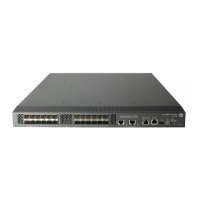308
[Sysname] bgp 100
[Sysname-bgp] ipv4-family vpnv4
[Sysname-bgp-af-vpnv4] filter-policy 2255 import
import route-policy
Description
Use the import route-policy command to apply an import routing policy to a VPN instance.
Use the undo import route-policy command to remove the application.
By default, all routes permitted by the import target attribute are accepted.
You can specify an import routing policy when the route redistribution control provided by the extended
community attributes is not enough.
• An import routing policy specified in VPN instance view is applicable to both the IPv4 VPN and the
IPv6 VPN.
• An import routing policy specified in IPv4 VPN view is applicable to only the IPv4 VPN.
• An import routing policy specified in IPv4 VPN view takes precedence over that specified in VPN
instance view. If you specify an import routing policy in both IPv4 VPN view and VPN instance view,
the policy specified in IPv4 VPN view is applied to the IPv4 VPN.
Syntax
import route-policy route-policy
undo import route-policy
View
VPN instance view, IPv4 VPN view
Default level
2: System level
Parameters
route-policy: Specifies the name of the import routing policy for the VPN instance, which is a string of 1 to
63 characters.
Examples
# Apply the import routing policy poly-1 to the VPN instance vpn1.
<Sysname> system-view
[Sysname] ip vpn-instance vpn1
[Sysname-vpn-instance-vpn1] import route-policy poly-1
ip binding vpn-instance
Description
Use the ip binding vpn-instance command to associate an interface with a VPN instance.
Use the undo ip binding vpn-instance command to remove the association.
By default, an interface is associated with no VPN instance. It belongs to the public network.

